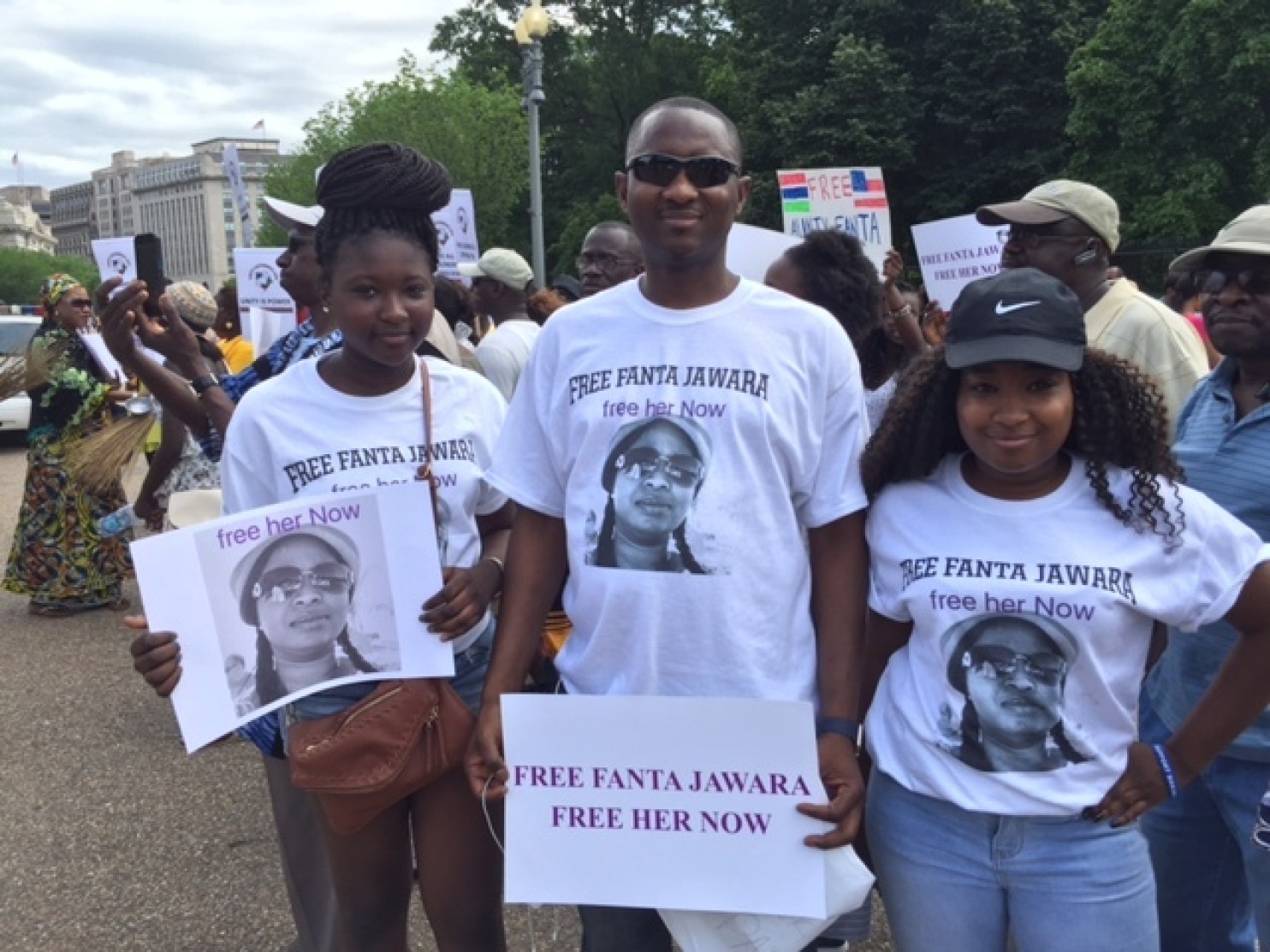
Columnist, The Washington Post
Their mother, Fanta Darboe Jawara, they learned, was being held in Gambia’s notorious Mile 2 Central Prison. And they have no idea when — or if — she’ll be released.
“On [June] 16th, it’ll be two months,” said Sarah Jawara, 12, who is counting the days without her mom. “I really miss her.”
Jawara, 45, a naturalized U.S. citizen, had returned to her homeland for the first time in 11 years for a family reunion. Just as she was getting ready to head back to her husband and girls in Frederick, Md., she was caught in a sweep of arrests at a government protest in Banjul, Gambia’s capital. Although her family has connections to Gambia’s opposition party, Jawara maintains that she was simply a bystander before she was beaten and locked up.
The protest unfolded that day — April 16 — as Jawara was waiting for a taxi after going to the bank.
“I was stopped by gentleman in plainclothes who asked me to give him my phone. I asked him why I should give him my phone,” Jawara said in her sworn statement from the Gambian central prison in Banjul.
He was a police intervention unit officer who was there to stop a protest by the United Democratic Party (UDP), a longtime critic of President Yahya Jammeh.
Jammeh has been the leader of the tiny West African country since his bloodless military coup in 1994. He has been criticized internationally for human rights abuses, especially for his stance on homosexuality.
“We will fight these vermins called homosexuals or gays the same way we are fighting malaria-causing mosquitoes, if not more aggressively,” he said in 2014. He also claimed to have come up with an HIV/AIDS cure made of herbs and bananas. The United States has officially condemned his statements.
Jawara and her family deny that she was participating in the protest.
“The [police] officers started dragging me and slapping me, they were beating me from the time I was arrested up to the time we arrived at the [police intervention unit] camp,” she said in her statement.
Jawara is charged with unlawful assembly, rioting, inciting violence, riotously interfering with traffic, holding a procession without a license, disobeying an order to disperse from an unlawful procession and conspiracy to commit a felony.
The prison where she is being held was recently the target of a U.N. report after inspectors were denied access to the facility. Freed prisoners reported sleeping on concrete floors and being fed cornmeal mixed with dirt.
This is not the Gambia that Jawara’s daughters know.
“I visited last year, and we went to all the touristy places,” said Aminata Jawara, 17, who is finishing up her junior year at Frederick High School and is about to receive an award in her nursing program.
But instead of all the end-of-the-school-year picnics and events she thought she’d be going to with her mom, she helped organize a protest outside the White House last weekend. She and her sister and her father, Ebrima Jawara, wore T-shirts bearing her mother’s face and waved banners calling for her release.
The girls say their mom is loud and funny, the one who chaperons every school field trip, never misses Muffins and Moms events. Their dad works as an auto mechanic at Ourisman Honda in Bethesda.
The Jawaras have lived in Frederick for more than 20 years. Both parents come from prominent Gambian families. Ebrima Jawara is the grandson of the president who was deposed in 1994. Fanta Darboe Jawara has family members who are leaders in the opposition party.
But they wanted to escape their small country’s politics and start over here.
“We both came here in 1990. I went to school at Frederick Community College,” Ebrima Jawara said. “And we did well. We bought a single-family house.”
Now he’s pushing government leaders to help free his wife. She is the subject of a Change.org petition, declarations by Amnesty International, State Department news briefings, online postings, tributes and that protest in front of the White House.
Ebrima Jawara contacted his local congressman, his senators and former New Mexico governor Bill Richardson, who runs a foundation helping free Americans in trouble around the globe.
“I think this is a case of egregious conduct against a person who happened to be at the wrong place at the wrong time,” Richardson told me Sunday. “This is an American citizen who has obviously been treated unfairly and maligned.”
Jawara and the others arrested in the protest are being represented by Gambian lawyers, who are demanding that the Gambian government drop all charges against her, said Erin Pelton, a senior advisor on prisoners and hostage recovery for the Richardson Center for Global Engagement.
The State Department has met with Jawara five times, been to all her court hearings and condemned the Gambian government’s “severe response to recent protests,” spokesman John Kirby said this month. But he had little information about Jawara’s condition or the state of her case.
Sarah, whose friends at school really don’t know what she’s going through, is also having a hard time understanding the arrests for something she sees every day, something she considers a fundamental human right.
“They should release them, even if they were protesting,” she said. “It was peaceful, they shouldn’t arrest people for a protest.”
Her American self can’t see it any other way.

Leave a Reply